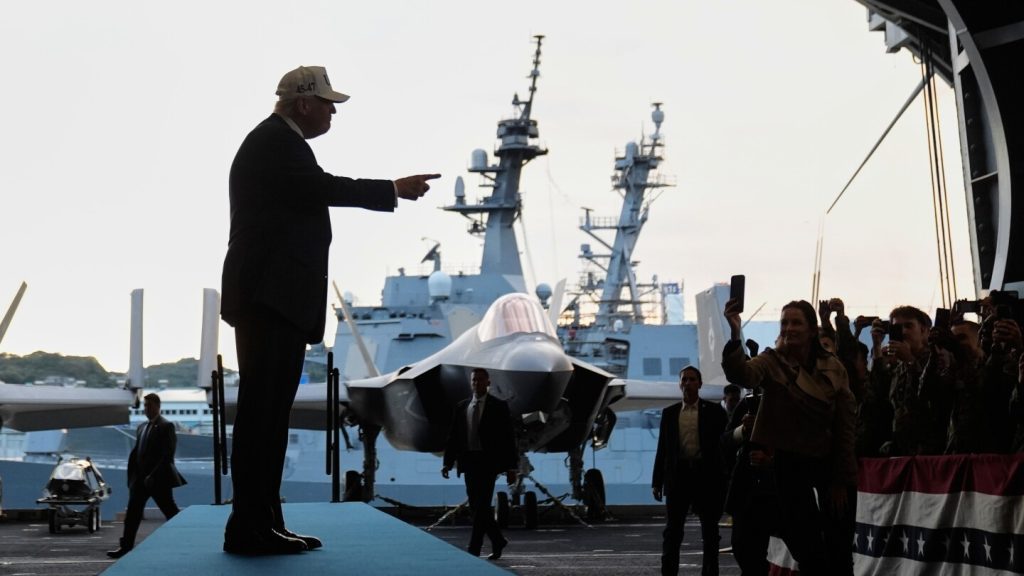WEST PALM BEACH, Fla. (AP) — It wasn’t long ago that President Donald Trump envisioned himself as a “peacemaker.”
In his inaugural address, Trump stated that his administration would evaluate “success not only by the battles we win,” but also by how many wars are ended—and importantly, the wars we avoid.
However, nine months into his second term, Trump is pursuing a “peace through strength” foreign policy agenda, a phrase he appropriated from former Republican president Ronald Reagan, who believed a robust military and economy were essential for deterring the Soviet Union.
Trump’s interpretation of Reagan’s doctrine includes stronger threats, bombings, and an abundance of bravado. It remains unclear how history will assess his version, but Reagan faced skepticism during his presidency as well.
“Many would have rated Reagan poorly around 1983,” noted University of Tennessee scholar Andrew Busch, referencing the U.S. invasion of Grenada that year. “By 1989, however, he was regarded as one of the greatest peacemakers of the 20th century.”
Trump’s Unique Diplomatic Approach
During his recent trip to Asia, Trump’s distinctive style took center stage. On his way to the ASEAN summit in Kuala Lumpur, he used social media to announce the cancellation of trade talks with Canada and a new 10% tariff on Canadian imports, prompted by a Canadian ad featuring clipped audio of Reagan criticizing tariffs.
While meeting with leaders in Malaysia and South Korea, the U.S. Navy intensified its operations, launching more strikes against drug boats in the Pacific. Additionally, his administration repositioned the USS Ford and a large contingent of sailors toward the Caribbean, marking the most significant troop buildup in Latin America in over half a century.
The Nuclear Testing Controversy
Shortly before a crucial meeting with Chinese President Xi Jinping, Trump hinted on social media about possibly lifting a longstanding U.S. ban on nuclear weapons testing. As he returned to Washington, he remained vague about whether he actually intended to resume explosive nuclear testing, which only North Korea has conducted this century.
Defense Secretary Pete Hegseth refrained from clarifying the nature of any potential testing, but he echoed Trump’s borrowed mantra of maintaining peace through strength, stating, “America will ensure that we have the most capable nuclear arsenal.”
Escalating Tensions in Nigeria
In another example of his assertive foreign policy, Trump warned Nigeria that he had instructed the Pentagon to prepare for possible military action due to the government’s failure to curb the persecution of Christians. He threatened to cease all aid to Nigeria and may even consider military intervention against the Islamic extremists perpetrating violence.
Nigerian President Bola Ahmed Tinubu countered Trump’s claims, asserting they misrepresent the country’s reality.
The Challenges of Inconsistent Policy
While Trump’s talk of nuclear testing rattled some, the reaction seemed relatively subdued. The president has a history of changing his positions suddenly, often leading to contradictions. Officials within his administration acknowledge that these shifts may appear erratic but argue they could serve to enhance U.S. influence and deter adversaries.
Nevertheless, a consistent policy has long been vital for national security, providing a stable foundation for international relations. “This reflects a lack of process,” said Ian Kelly, a former U.S. ambassador, pointing out that decisions seem to be made without consulting key stakeholders.
Caution Against “Endless Wars”
Despite the militaristic actions of his administration, Trump maintains the “peacemaker” label. He points to airstrikes on Iranian nuclear facilities as a significant accomplishment, despite claims of progress at these sites from the head of the U.N. nuclear watchdog.
Trump’s recent actions in the Caribbean target Venezuelan drug smugglers and appear to lack substantial political repercussions for him. However, experts warn that he should navigate carefully to avoid pitfalls similar to those seen in Iraq and Afghanistan. “Each of these strikes may seem decisive, but the underlying issues may still persist,” cautioned Justin Logan from the Cato Institute.



